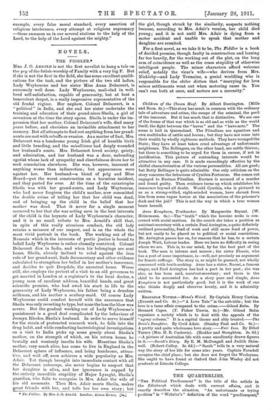NOVELS.
THE FIDDLER.*
Mits. J. 0. Aim= is not the first novelist to bang a tale on the peg of the fetish-worship of Family with a very big F. But if she is not the first in the field, she has some excellent qualifi- cations for the task, and the picture of the two old ladies, Lady Weybourne and her sister Miss Anna Delacourt, is extremely well done. Lady Weybourne, mail-clad in well- bred self-satisfaction, capable of generosity, but at best a benevolent despot, is a really impressive representative of the old feudal regime. Her nephew, Colonel Delacourt, is a " political " in India, and she and her sister undertake the training and education of their grand-niece Sheila, a girl of seventeen at the time the story opens. Sheila is under the im- pression that her mother, Colonel Delacourt's wife, died many years before, and cherishes an invincible attachment to her memory. But all attempts to find out anything from her grand- aunts are met with rebuffs or evasion. As a matter of fact, Mrs. Delacourt was a handsome young Irish girl of humble birth and little breeding, and the misalliance had deeply wounded her husband's aunts. Mrs. Delacourt loved society, gaiety, and admiration, and her husband was a dour, unbending egotist whose lack of sympathy and cheerfulness drove her to seek consolation elsewhere. She was, however, innocent of anything worse than indiscretion ; but appearances were against her. Her husband—a blend of prig and Blue Beard—put the worst construction on a harmless incident, and they parted for ever. At the time of the catastrophe Sheila was with her grand-aunts, and Lady Weybourne, who had never forgiven the child's mother, now committed the double crime of telling her that her child was dead, and of bringing up the child in the belief that her mother was dead. That it never for a single moment occurred to her that she was acting save in the best interests of the child is the keynote of Lady Weybourne's character, and it is no small tribute to Mrs. Arnold's skill that, in spite of this really atrocious conduct, the old lady retains a measure of our respect, and is on the whole the most vivid portrait in the book. The working out of the Nemesis which in the interests of poetic justice is bound to befall Lady Weybourne is rather clumsily contrived. Colonel Delacourt dies in India, and when his belongings are sent home, Sheila, already inclined to rebel against the iron rule of her grand-aunt, finds documentary and other evidence calculated to strengthen her belief in her mother's innocence, and decides to quit Deepdale, the ancestral home. Worse still, she employs the pretext of a visit to an old governess to get married in London at a registrar's to the local doctor, a young man of excellent address, beautiful hands, and great scientific promise, who had owed his start in life to the generosity of Lady Weybourne, his father being a drunken milkman, and his mother a scullery-maid. Of course Lady Weybourne could comfort herself with the assurance that Sheila was only reverting to type, but none the less the blow was severe. But the gradual working out of Lady Weybourne's punishment is a good deal complicated by the behaviour of Jermyn Rhodes, Sheila's husband. In order to nerve himself for the strain of protracted research work, he falls into the drug habit, and while conducting bacteriological investigations on a visit to India picks up some gossip about Sheila's mother, on the strength of which, on his return home, he brutally and wantonly insults his wife. Meantime Sheila's mother, very much alive, has come to live in England in the Delacourt sphere of influence, and being handsome, attrac- tive, and well off, soon achieves a wide popularity as Mrs. Adair. Yet though brought into immediate contact with all the Delacourt entourage, She never begins to suspect that her daughter is alive, and her ignorance is capped by the entirely incredible stupidity of Major Lysaght, Sheila's guardian, who fails to recognise in Mrs. Adair the wife of his old messmate. Then Mrs. Adair meets Sheila, makes great friends with her, and tells her her own story ; but • The Fiddler, By lira. J. 0. Arnold. London; Alston Rivers. (68.] the girl, though struck by the similarity, suspects nothing because, according to Mrs. Adair's version, her child died young ; and it is not until Mrs. Adair is dying from a motor accident and unable to speak that mother and daughter are reunited.
For a first novel, as we take it to be, The Fiddler is a book of decided promise, though faulty in construction and leaning far too heavily, for the working out of the plot, on the long arm of coincidence as well as the crass stupidity of otherwise intelligent people. The minor characters afford welcome relief, notably the vicar's wife—who derives from Mrs. Nickleby—and Lady Tremaine, a genial worldling who is responsible for the obiter dictum that "marrying for love minus settlements went out when motoring came in. You can't run both at once, and motors are a necessity."






















































 Previous page
Previous page